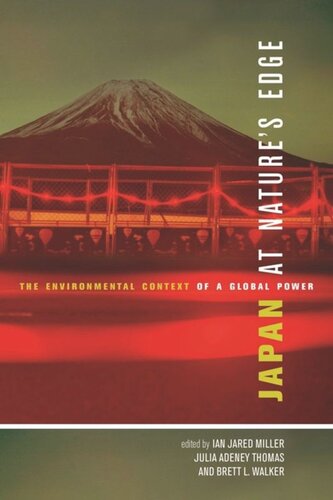

Most ebook files are in PDF format, so you can easily read them using various software such as Foxit Reader or directly on the Google Chrome browser.
Some ebook files are released by publishers in other formats such as .awz, .mobi, .epub, .fb2, etc. You may need to install specific software to read these formats on mobile/PC, such as Calibre.
Please read the tutorial at this link: https://ebookbell.com/faq
We offer FREE conversion to the popular formats you request; however, this may take some time. Therefore, right after payment, please email us, and we will try to provide the service as quickly as possible.
For some exceptional file formats or broken links (if any), please refrain from opening any disputes. Instead, email us first, and we will try to assist within a maximum of 6 hours.
EbookBell Team

5.0
50 reviewsJapan at Nature’s Edge is a timely collection of essays that explores the relationship between Japan’s history, culture, and physical environment. It greatly expands the focus of previous work on Japanese modernization by examining Japan’s role in global environmental transformation and how Japanese ideas have shaped bodies and landscapes over the centuries. The immediacy of Earth’s environmental crisis, a predicament highlighted by Japan’s March 2011 disaster, brings a sense of urgency to the study of Japan and its global connections.
The work is an environmental history in the broadest sense of the term because it contains writing by environmental anthropologists, a legendary Japanese economist, and scholars of Japanese literature and culture. The editors have brought together an unparalleled assemblage of some of the finest scholars in the field who, rather than treat it in isolation or as a unique cultural community, seek to connect Japan to global environmental currents such as whaling, world fisheries, mountaineering and science, mining and industrial pollution, and relations with nonhuman animals.
The contributors assert the importance of the environment in understanding Japan’s history and propose a new balance between nature and culture, one weighted much more heavily on the side of natural legacies. This approach does not discount culture. Instead, it suggests that the Japanese experience of nature, like that of all human beings, is a complex and intimate negotiation between the physical and cultural worlds.
Contributors: Daniel P. Aldrich, Jakobina Arch, Andrew Bernstein, Philip C. Brown, Timothy S. George, Jeffrey E. Hanes, David L. Howell, Federico Marcon, Christine L. Marran, Ian Jared Miller, Micah Muscolino, Ken’ichi Miyamoto, Sara B. Pritchard, Julia Adeney Thomas, Karen Thornber, William M. Tsutsui, Brett L. Walker, Takehiro Watanabe.